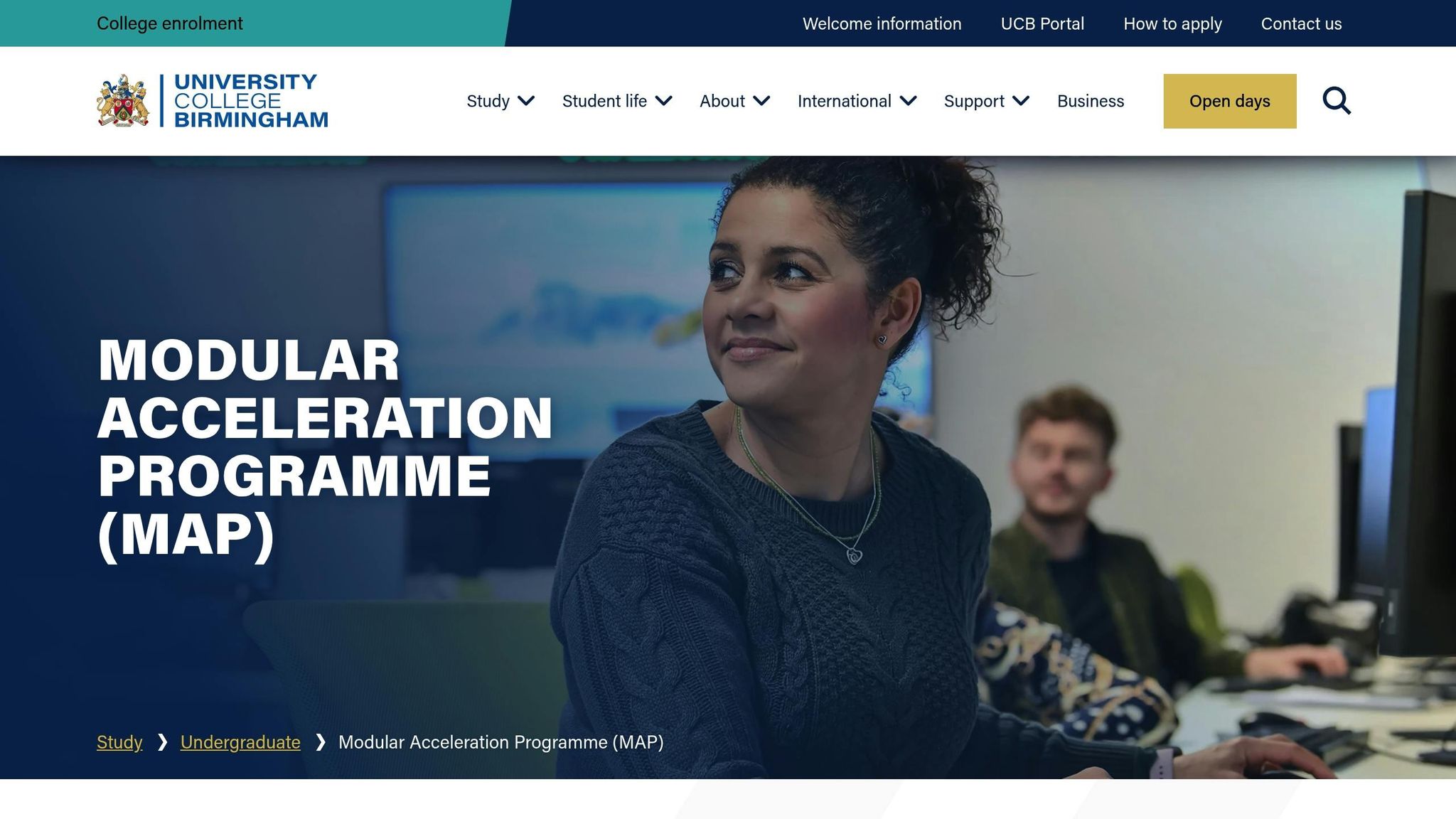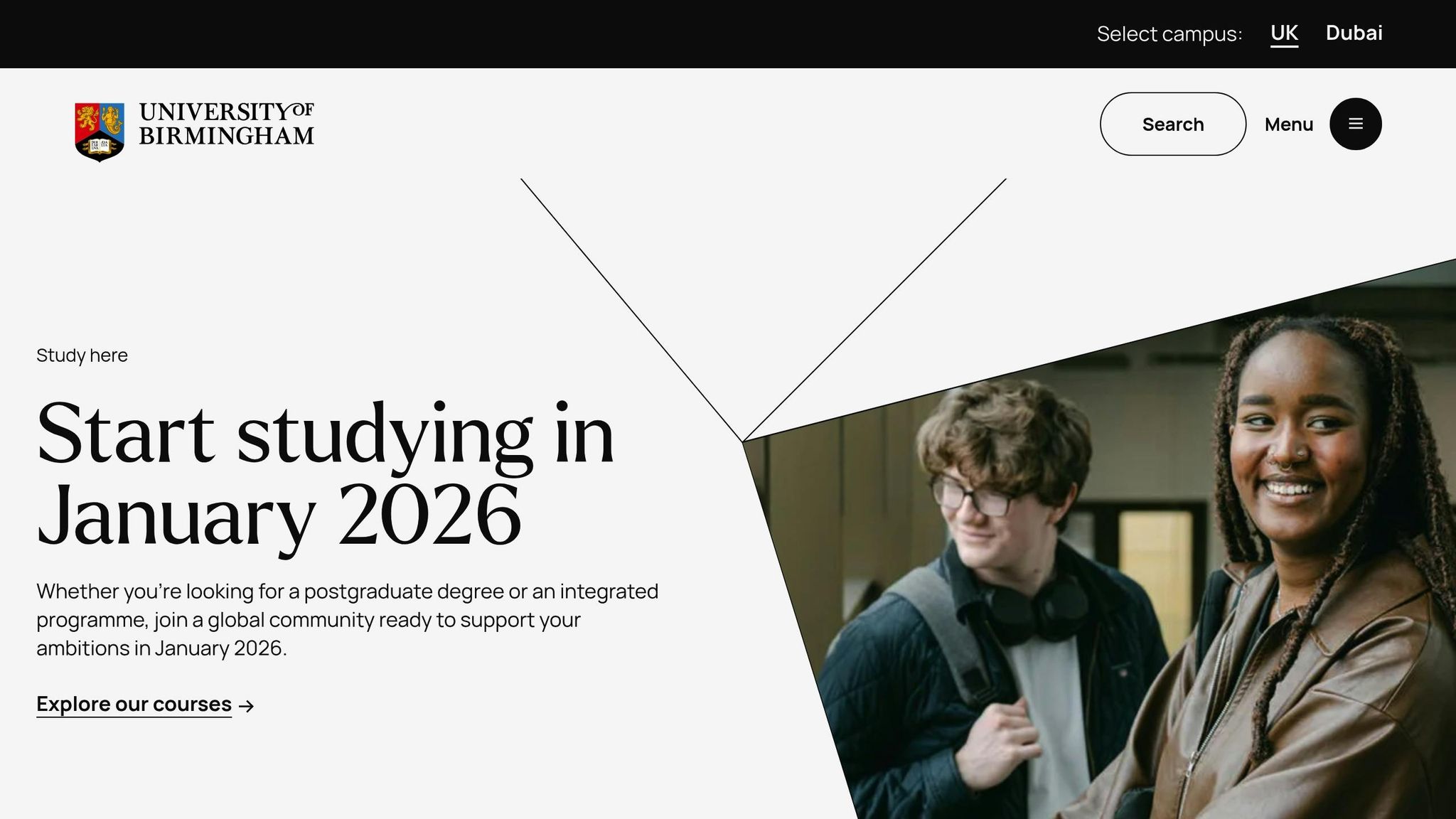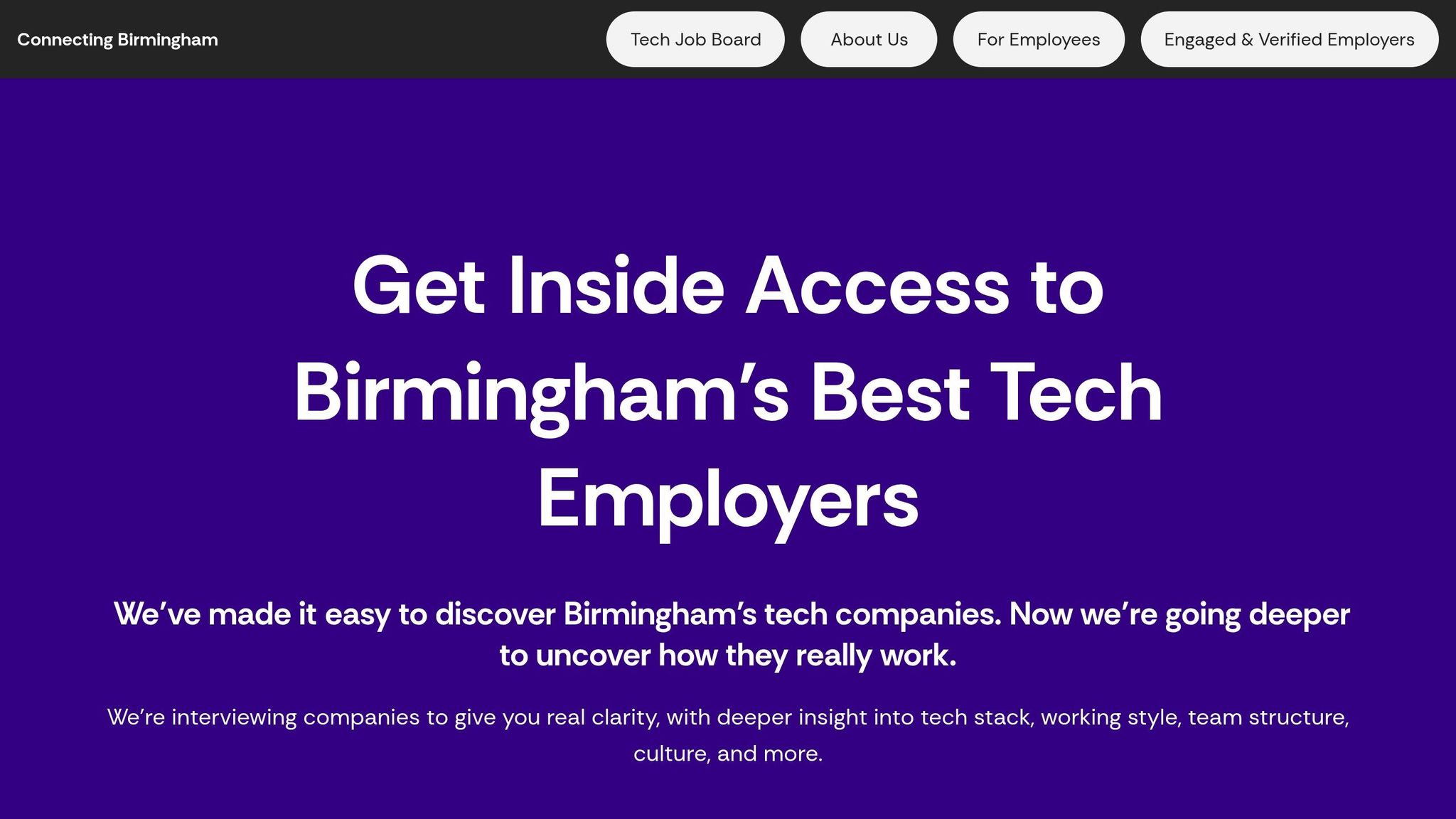Birmingham is addressing the growing demand for advanced digital skills with tailored training programmes, industry partnerships, and community initiatives. The city's tech sector has seen job postings requiring digital skills double from 2.4 million in 2012 to 4.9 million in 2022, highlighting a critical skills gap. This gap poses risks to the UK economy, with potential losses of £27.6 billion by 2030.
Key solutions include:
- University Programmes: Flexible courses like the Modular Acceleration Programme (MAP) and Skills Bootcamps help professionals gain expertise in cybersecurity, AI, and cloud computing without disrupting their work-life balance.
- Community Initiatives: Local organisations offer workshops and mentoring, making tech careers accessible to diverse groups.
- Industry Collaborations: Partnerships between academia, businesses, and government ensure training aligns with job market needs.
- Job Resources: Platforms like Connecting Birmingham link local talent with vetted employers, simplifying the job search process.
These efforts are transforming Birmingham into a hub for tech talent, ensuring professionals can thrive while bridging the digital skills gap.
Future In Technology: Digital skills
University Training Programmes
Birmingham's universities are tackling the digital skills gap head-on with programmes designed to fit around the busy lives of tech professionals. These initiatives allow workers to enhance their expertise without having to sacrifice work or family time, forming a key part of the city's broader digital skills development efforts.
Modular Acceleration Programme (MAP)

University College Birmingham stands out as the sole provider of the Modular Acceleration Programme (MAP) in the city. This initiative offers free short courses in high-demand fields like Introduction to Cyber Security and Introduction to Digital Marketing. What makes MAP particularly appealing is its modular structure, which allows participants to earn credits toward a Higher Technical Qualification (HTQ) at their own pace. Delivered in 12-week cycles, the programme is ideal for those juggling work, childcare, or other responsibilities. Learners can access up to 40 credits, with tuition fees covered by a grant of £3,083.
MAP also plays a pioneering role as a pilot for the government's upcoming Lifelong Learning Entitlement scheme, set to launch in 2026. Open to individuals aged 19–60 who live or work in England, this programme broadens access to flexible learning opportunities.
Skills Bootcamps at the University of Birmingham

The University of Birmingham offers part-time Skills Bootcamps that run for up to 16 weeks, designed to help professionals either pivot to new technical careers or advance their current skill sets. These bootcamps are structured to fit into diverse schedules, with options including intensive blocks, online sessions, and evening classes.
"The flexible part-time format of the new University of Birmingham Skills Bootcamps makes it possible for people to diversify and develop the skills needed for alternate technical careers."
- University of Birmingham
For those seeking further opportunities, Continuing Professional Development (CPD) courses and Postgraduate Microcredentials provide additional pathways for upskilling without requiring a career break. Birmingham City University also collaborates on flexible bootcamps, further expanding the range of options available.
Local Training Centres and Community Programmes
Local training centres and community-driven initiatives provide hands-on pathways for people looking to step into tech roles. These programmes are designed to equip individuals with practical digital skills, offering a smoother transition into technology-focused careers. They work alongside university programmes, delivering accessible, real-world learning experiences.
School of Coding & AI
Birmingham has recently introduced a dedicated training hub centred on coding and artificial intelligence. This centre addresses the growing need for practical knowledge in areas like AI and cybersecurity. It offers courses tailored to a range of skill levels, from complete beginners to those with advanced expertise, ensuring the training aligns with the demands of local industries.
Community Training Programmes
Beyond specialised centres, Birmingham has shown a strong commitment to making tech training more inclusive through various community-led initiatives. Local organisations host workshops, mentoring opportunities, and introductory courses covering topics like web development and digital marketing. These programmes aim to make tech careers more accessible to a diverse audience.
What sets these community initiatives apart is their focus on breaking down barriers. They often combine technical training with support for career transitions and professional growth. Flexible schedules, affordable pricing, and even childcare options are offered to ensure that upskilling in digital fields is a realistic option for everyone, regardless of their circumstances.
sbb-itb-1ad140f
Industry Partnerships for Skills Development
Birmingham's commitment to digital upskilling gets a major boost through partnerships between academia, industry, and government. These collaborations bring together academic expertise and industry know-how to align with the ever-changing demands of the tech world.
By blending structured education with practical experience, local initiatives equip learners with workplace-ready skills. Educational institutions focus on formal training and research, while industry partners contribute insights into current job market demands and emerging technologies. Government backing ensures these opportunities reach people across the city.
These partnerships not only address Birmingham's growing tech requirements but also open doors to mentoring and networking, helping to develop local talent and support long-term career progression.
Connecting Birmingham: Local Job Board and Career Resource

After gaining new skills, finding the right job is the next big step for tech professionals in Birmingham. That’s where Connecting Birmingham steps in, offering a platform dedicated to linking local talent with trusted tech employers across the city.
This platform builds on the robust training programmes available in Birmingham, giving technology graduates a valuable resource to kick-start their careers. Acting as both a job board and a company directory, it focuses exclusively on the city’s tech sector. By featuring opportunities from carefully vetted employers, it ensures candidates can find roles that make the most of their new skills.
Company Profiles and Job Listings
Connecting Birmingham doesn’t just list jobs - it provides a deeper look into potential employers. Each company profile goes beyond the standard job description, offering insights into company culture, team dynamics, and work environments. This extra layer of detail helps job seekers make informed choices about where they want to work.
To maintain high standards, the platform verifies all companies before they can post opportunities. This process ensures that only reliable employers with fair practices can connect with job seekers, protecting candidates from questionable job offers. Companies must prove their credibility and commitment to ethical employment before gaining access to the platform.
Users are kept in the loop with weekly updates on new opportunities, and the job alert system allows professionals to receive tailored notifications based on their skills and career goals. This feature is particularly helpful for those who have recently completed upskilling programmes and are eager to apply their new expertise.
The company directory offers even more transparency by providing details on team sizes, technologies in use, and organisational values. This information enables candidates to evaluate whether a company aligns with their career ambitions and technical abilities.
Matching Local Talent with Employers
One of the platform’s greatest strengths is its local focus, which helps bridge the gap between Birmingham’s tech professionals and employers. By concentrating on the city’s unique ecosystem, Connecting Birmingham creates meaningful connections within the tech community. It understands the specific needs of local businesses and the career opportunities available to Birmingham residents.
For job seekers, the platform is entirely free to use. They can browse job listings, explore company profiles, and sign up for tailored alerts without any financial barriers. This accessibility ensures that professionals from all backgrounds can take advantage of the platform’s resources.
Employers, on the other hand, gain access to a pre-qualified talent pool of local professionals. This localised approach not only reduces recruitment time and costs but also strengthens community ties. Companies can highlight their culture and values to attract candidates who are genuinely invested in Birmingham’s tech industry.
The platform’s matching process takes into account both technical skills and cultural fit, recognising that successful placements depend on more than just qualifications. This is particularly beneficial for those who have recently completed upskilling programmes, as it helps them demonstrate how their new skills can add value in the workplace.
Beyond job matching, Connecting Birmingham plays a vital role in building a sense of community. By fostering relationships between tech professionals and employers, it supports Birmingham’s growing reputation as a major tech hub outside London. This focus ensures that the city’s digital upskilling efforts translate into meaningful employment opportunities, further strengthening Birmingham’s position in the tech world.
Conclusion: Supporting Birmingham's Tech Workers
Birmingham has created an environment where tech professionals can thrive, thanks to its focus on effective training and strong local job connections. With a range of opportunities - from forward-thinking university courses and grassroots initiatives to partnerships with industry leaders - the city caters to various learning styles and career ambitions.
The collaboration between universities, businesses, and local authorities ensures that training stays relevant to the changing demands of the tech industry. Programmes like Birmingham Digital Futures align their offerings with what employers need, while organisations like Entrust help learners transition smoothly from education to employment.
Birmingham’s training programmes are designed to deliver more than just certificates. With flexible, modular options and direct industry links, participants can put their new skills to work immediately, paving the way for real career growth. Initiatives like the MAP programme address a wide spectrum of needs, whether someone wants to switch careers entirely or simply enhance their current skill set.
For tech professionals, this interconnected system of training, mentorship, and job placement provides a clear path to career advancement. The city’s supportive community ensures that upskilling efforts translate into tangible results.
FAQs
What are the benefits of the Modular Acceleration Programme (MAP) for professionals looking to enhance their digital skills?
The Modular Acceleration Programme (MAP) provides a flexible way for professionals to build their digital expertise with government-funded modules. These modules are designed to equip learners with key skills that employers actively seek. With the ability to study at their own pace, participants can earn credits towards higher technical qualifications, all while benefiting from free tuition. This makes MAP an accessible and budget-friendly route for upskilling.
Additionally, MAP offers short professional courses specifically crafted to help individuals navigate career changes within the digital sector. By reducing financial hurdles and focusing on practical, job-focused training, the programme enables professionals to stay ahead in an ever-changing job market.
How do industry partnerships help shape Birmingham’s training programmes to meet job market demands?
Industry partnerships are key to aligning Birmingham’s training programmes with the ever-changing demands of the job market. By working closely with local businesses and organisations, these collaborations help shape courses and initiatives that prioritise skills in demand and keep pace with emerging technologies.
Take, for instance, partnerships with tech firms and healthcare providers. These collaborations create specialised training opportunities aimed at addressing workforce shortages, such as expertise in digital tools or health technology. This not only benefits local employers by filling critical gaps but also ensures professionals are well-prepared to succeed in Birmingham’s expanding industries.
How does Connecting Birmingham help job seekers find roles that match their digital skills?
Connecting Birmingham serves as a bridge between job seekers and the right opportunities by offering a well-curated platform featuring verified company profiles and job openings. It goes beyond just listing jobs; it provides insights into roles, workplace culture, and team dynamics, helping individuals make well-informed decisions about their career paths.
By linking local tech talent with trusted employers, the platform ensures professionals can secure roles that align with their newly developed skills and career goals. This initiative plays a key role in addressing the increasing need for digital expertise within Birmingham's thriving tech sector.


